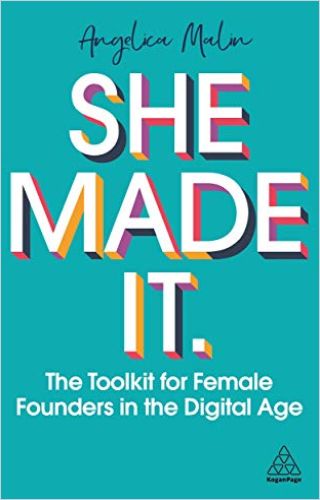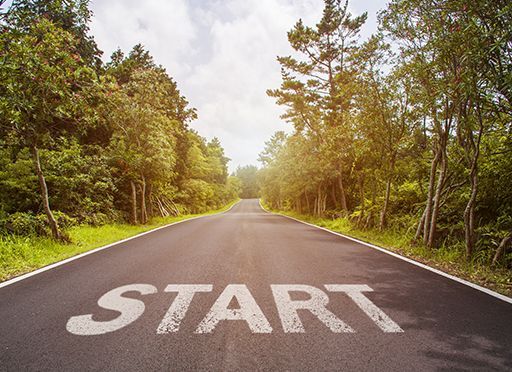“It’s So Easy Now to Start Something”

Angelica, tell me a little bit about you and your business and how you came to write She Made It.
Angelica Malin: I run an online lifestyle magazine called About Time, which I’ve done for about 10 years. The book came about because I was hosting lots of events in London and panel talks around female entrepreneurship. And I saw a lot of the same questions being asked at the end of our events like, “When’s the right time to launch?” “How do I know I’m ready?” and “How do I start a business?” So the book was meeting that need.

You show that entrepreneurship looks different for women and suggest they should first figure out what they want their lives to look like. You emphasize mind-set and being aware of strengths and weaknesses too, but why is considering what success means to them a crucial first step for women entrepreneurs?
In terms of mind-set and creating a business around your life, that came out of my research as well, speaking to a lot of female entrepreneurs and founders, that women often started businesses at points in their life where they realized that their career beforehand wasn’t sustainable with some factor – for example, having children, wanting to move abroad, or wanting to have more flexibility and freedom. That was the impetus to start their own thing. The book focuses on how to create a business that actually works really well with your lifestyle and is something you enjoy rather than you feel like it’s running you. You’re not a slave to the business, but it actually benefits you in lots of ways.
Take-Aways:
- The pandemic presents an opportunity for women to think about launching their own business.
- Use social media to build a dialogue with your audience and figure out how to serve their needs.
- If you’re feeling “imposter syndrome,” it’s an indication you’re stepping out of your comfort zone, which is a good thing.
What are the kinds of things that women should be thinking about when they’re considering what sort of business to start?
One of the things I saw was women not realizing that we can all perhaps do the super long 18-hour days when you’re starting up, but how long do you actually want to do that for?
How can you create a business that doesn’t need you to invest so much time and energy to continue to run and be successful? Something that you might be able to step away from as well?
Angelica Malin
That’s why there’s such a focus on delegation and automation in the book. How can you create something that perhaps involves a lot of your energy to start with, but then has the ability to keep growing without that kind of constant hustle? Because you can just burn out quite quickly.
Why is now a more favorable time for women founders than ever before?
Well, it and it isn’t. A lot of female-owned businesses started up in the last 18 months because of the COVID-19 pandemic. I think for all of us, the pandemic was this shock to the system and perhaps things that you were sitting on that you’d always dreamed about doing, you suddenly find yourself in a situation where you had to get creative. Or you couldn’t do the job that you were doing before or you got made redundant. There was a lot of sudden impetus to start things. Not just women, but business owners generally. We suddenly saw this huge explosion in entrepreneurship. It was almost like this wake-up call about the thing that you’d been sitting on for years you suddenly could do. There’s some creativity in the chaos of what was going on. It felt like the rulebook had gone out the window with what people’s lives look like, and you suddenly had this opportunity to create something out of that. So, there was a big boom. The other thing for women specifically was having children at home, having to do more child care, possibly home schooling, etc., and they realized that their previous work wasn’t compatible.
Yes, COVID-19 definitely impacted everyone but most especially women with children.
Well, it always comes from women having more care responsibility. It has a huge impact on what you can do professionally. So, in that respect, it did impact women a lot more because they were basically doing two jobs the whole time.
So what are some of the things that keep women from considering even founding their own company?
My research shows one of the big things that holds women back is this feeling that you need to be completely ready before you launch. There’s this hesitancy around starting something and learning on the job, which we’ve seen anecdotally with guys is less of a problem. They’re more willing to try something and fail or try before they’re ready or before they have the skill set. So, it’s less of a career ladder and more monkey bars, going across rather than up the whole time, because you don’t always have the skills to go up.
Sometimes you have to go across and learn new things, and for women that can be quite daunting.
Angelica Malin
I think it’s a confidence thing, largely. I also think it’s a community-based problem. If you’re in circles where lots of people are starting things and encouraging that kind of mind-set of entrepreneurship, it feels safer and easier to launch. When you feel like you’re the lone person doing it, that’s really intimidating. So I think for men who’ve perhaps been in environments where they’re encouraged to take risks, they feel more comfortable starting.
That makes sense. Networks really do make a difference. That’s classic advice, but somehow women don’t always hear it.
It might not be the reason you start it, but it might be the reason you continue with it. When you’re having those down days where you’re doubting yourself, your network can kind of bring you back up and help you stick at something.
Yes. Good point. So as a founder and editor-in-chief of an online business, you spend a lot of time connected to the internet and on your social media accounts. What are the main ways that you use social media?
I think again, it’s about community. It’s a really good place to build connections with the people that you’re serving. So, one side is building the connection, but also building a two-way street of listening to people and finding out what their pain points are, or what they’re struggling with. It can help you create better content if you’re able to engage in a dialogue with the audience rather than a monologue. We use it to get ideas for whether or not events might be popular with people or I’m thinking about launching a new podcast and just hearing from people about what would be useful to them. It’s leading with value. And then for books, for instance, having an audience is super important. It’s kind of like a business card to show to a publisher or potential brand that you’re working with to say, I have people that are engaged and interested in my work.
What are some things for entrepreneurs to keep in mind when they create content for their social media account?
One of the things that we’re told as business owners and brands is to have a niche. And I think it’s quite bad advice. We’re often told we need to be really specific about what our area of the internet is and really specific about the people we’re serving.
I think niching down too early on in a business can be quite detrimental. You need to create space for yourself to see where the business is going to go and how it’s going to evolve.
Angelica Malin
If you get really specific about whom you think you’re serving, you may block out the people you’re actually serving and not listen to them. Being too controlled and fixed in your mind-set with business can be detrimental. So, I would say when you think about creating content to try not to get too specific, listen to the community more than you’re speaking and then start creating a strategy around those people.
Good advice. When thinking about branding, how do you distinguish between your personal company and company brand? Is that still a question these days?
I almost think company brands don’t exist anymore. I think companies sound increasingly more personal, and you expect to go on a company’s Instagram and for it to sound like a person. So, in that respect, I think we don’t want to hear from brands that sound corporate or inauthentic or staged. We want to connect with businesses that sound like people. And actually, I think we want people to sound more like businesses. They’ve almost flipped. I think we expect business owners to stand for something, to have ethics and values that they broadcast, to care about certain issues and have an ethos. And those are things that we normally would apply to a company which we’re now expecting from the individual. So, I think they’ve actually switched around. I definitely feel that pressure to sound like a business for myself and to make my business sound like a person.
Interesting. Do you foresee social media offering even more business opportunities in the future?
Yes, but I think it’s become such a saturated space that standing out is increasingly difficult. So you need to do more to get the same results that you would have got quite easily a couple of years ago. Platforms like TikTok perhaps are still less exploited by businesses than trying to stand out on Instagram, for example. Yes, you have to put more into it and you kind of have to put a bit more money into it as well.

What about in terms of social media being a place for more commerce?
Yes. We’ve seen this huge direct-to-consumer boom. And now you don’t even really need to have a website. You can just have an Instagram shop and that can be your sole place. It’s so easy now to start something because the investment you need to put into it to get something off the ground is so much less, and you have so many more touchpoints with the consumer that you might not have had a few years ago, where you don’t need loads of ad spend.
You don’t need a lot to get off the ground. You just need a good idea and a sense of the person that you’re talking to and why they buy your products.
Angelica Malin
But it’s also meant there’s a lot more focus on aesthetics for brands, having really good brand photography or having a product that’s great to photograph, so people want to share it on Instagram. How does it look? If that’s how your business is getting to market, then you need to be thinking about that.
Good insight, thanks. On a more personal note, in your book, you talk about imposter syndrome. How can women avoid it and stay the course? Any practical tips for women to support their positive mind-set and mental toughness?
There are two things I’d say about that. One is, I don’t think imposter syndrome is necessarily a bad thing. Having that sense of self-doubt can be beneficial in that you push yourself to continue. Being nervous can be beneficial because you’re pushing yourself to grow and to evolve. A few nerves can help you. I don’t think it’s something we ever quite get rid of. I think it’s something we learn to live with. It’s also usually a sign that you’re stepping up. So, when you feel that anxiety around, “Am I ready for this?” it’s a sign that you are going after something that feels a little bit out of reach, which is a good thing. If you’re not feeling that, you’re probably staying in your comfort zone. So it’s not necessarily a bad thing.
The other thing I’d say is, we’re very quick to label it as imposter syndrome. And I think over-labeling these things isn’t particularly helpful.
Angelica Malin
It’s often the case that you actually don’t have the knowledge and you have to go out and do a course or take on a mentor who can teach you things. There are practical things you can do. Instead of sitting in that emotionally, figure out what to do next. I have big imposter syndrome around the finances of business. I hate all the stuff to do with accounting and tax returns. And part of addressing that was doing a course so at least I understood the language. When my accountant told me something, I could understand it. But then there are also parts of your business that you want to outsource because they’re not your skill set, and that’s OK, too.
You say in your book to not be afraid of thinking about your competition, not as some huge threat, but as an opportunity to confront your own fears but also to measure against your own business. It doesn’t have to deflate you.
No, it doesn’t. It can be an inspiration. You can see someone doing something and be like, “That’s amazing. That’s something I’d like to bring into my life.” Or, “That’s something I would like to do in the future.” It should be a source of inspiration. But that comes back down to confidence in your own ability to go after those things.
How can founders wear all the different hats they need to, but not go crazy with multitasking?
I think multitasking in general is just a bad idea. As someone who has a kind of portfolio career doing lots of different things, if I try in a day to flip between tasks too much, there’s always a cognitive penalty for that. You don’t get any further forward. I think the trick is knowing the difference between being efficient and being effective. Efficiency is getting a lot of stuff done, but they might not be things that lead towards your goals. Being effective is being strategic with how you’re spending your time. You might do one thing in a day, but it’s a big thing and it leads you closer to a goal. So, understanding the difference and not filling your day with lots of small tasks, I think that’s important. If you do want to grow your business quickly, understanding where you are most valuable in the business and where you can get other people, if you have the finances to, to come in to do the admin of the business, if you’re the person that’s doing the big kind of creative thinking. So just be aware of how you’re spending your time.
How can women guard against the stress of running a business, being responsible 24/7?
I think it’s really difficult now because with remote working, I think the boundaries between everything becomes so blurred. It’s very difficult not to pick up your laptop and do a couple of emails while you’re watching TV in the evening if you’re working from home in the same space. I think that’s really challenging. It is easier if you have a family or a partner where they come home and you’re forced to put down tools. Without that, I think it’s quite challenging. I’m a big fan of getting into a different space. I’m in a co-working space, which I come into. I think that separation of space between home and leisure is really important. If you can go somewhere that isn’t home, I think that’s good. Otherwise, it’s just a boundary thing. When is your energy best? When can you work the hardest? Often, I think we work late because we haven’t been efficient in the day, and we’re trying to make up for that. So, can you just work a bit smarter so that you don’t have to keep going on into the evening?
About the Author:
Angelica Malin is an entrepreneur and best-selling author of She Made It: A Toolkit for Female Founders in the Digital Age. She founded and is editor-in-chief of About Time Magazine, an online lifestyle website based in the UK.





